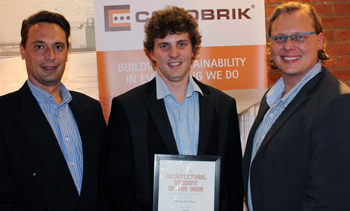Latest News Archive
Please select Category, Year, and then Month to display items
19 November 2018
|
Story Charlene Stanley
|
Photo Charlene Stanley
 Prof John Mubangizi, Dean of the Faculty of Law, encouraged delegates at the Fifth Annual International Mercantile Conference to share ideas on best international practice in their various fields.
Prof John Mubangizi, Dean of the Faculty of Law, encouraged delegates at the Fifth Annual International Mercantile Conference to share ideas on best international practice in their various fields.
“Don’t say anything online that you wouldn’t want plastered on a billboard with your face on it.”
This famous quote by international tech expert Erin Bury should be a guiding light when it comes to online habits in the workplace, according to Francois Cilliers, UFS Lecturer in Mercantile Law.
In his presentation Could Social Media be the Gateway to Employment Discrimination? he warned that employees have a responsibility not to bring their employers in disrepute through their comments on social media.
“Posts, updates, tweets, and comments are considered to be publications and can therefore never be seen as privileged information,” he explained.
Responsibility on employees and employers alike
He pointed out that employers also had a responsibility regarding the way in which they use the information about prospective employees obtained via social media.
“Nowadays, approximately 75% of companies hire through social media. In the US, recruiting companies spend hours researching candidates, making full use of what they can find on social media. It was found that 50–80% of employers frowned upon posts and pictures featuring drug and alcohol abuse, profanity, and bad grammar.”
He warned that employers needed to tread lightly, as a decision not to employ someone as a result of information on the prospective employee’s political views and sexual orientation could constitute unfair discrimination as set out in the Employment Equity Act.
“An employer who wishes to use a screening process (utilising social media) has to prove that the information and the process is objectively necessary and can be justified with reference to the inherent requirements of the job,” he explained.
“As technology and electronic systems advance, so too should the applicable labour laws.”
Cilliers’ presentation formed part of the Fifth Annual International Mercantile Law Conference recently hosted by the Faculty of Law on the Bloemfontein Campus.
Incorporating new technology in teaching and research
“This conference is an opportunity to share ideas on best practice in what is perceived as a ‘difficult’ field within Law,” said Prof John Mubangizi, Dean of the Faculty of Law, as he opened the proceedings. Topics in the discussion sessions ranged from Racism in the workplace and The underrepresentation of females in the judiciary, to Decriminalisation of cannabis: A recipe for healthy employer-employee relations?
“Conferences such as these help us to take advantage of the newest developments in technology to advance our teaching and research,” said Prof Mubangizi.
“To quote Einstein: ‘We can’t solve problems by using the same kind of thinking we used when we created them.’”
Department of Architecture recognises excellence
2014-11-20

From the left are: Gary Westwood, Marius du Plessis and Henry Pretorius
Photo: Ifa Tshishonge
Front page design by Marius du Plessis |
Marius du Plessis received the first prize in the Regional Corobrik Student of the Year Award for his design of a National Geothermal Research and Educational Centre in Johannesburg. The award ceremony was hosted by the Department of Architecture at the University of the Free State.
Anja Lareman was awarded the second prize for her Psychiatric Unit for the Deaf in Worcester and Mariska Peel received third prize for her design of a laboratory for the after oil epoch in Durban.
The Corobrik award for Best use of clay masonry brickwork was awarded to Valentino Moutzouris for his design of a Performing Arts Centre in Wynberg, Cape Town.
The event was well attended by architecture students who hoped to take home an award. Projects exhibited, received distinctions in one or all of the three main components, including design, the architectural theoretical treatise and building sciences.
“This is the greatest award that one could win in the Free State. It came with so much blood, sweat and tears, as I had to live, eat and work day and night at the same place in order to finish the project,” said Marius, master’s student in Architecture. He said that he hopes the project can be developed and implemented in mine shafts to solve the energy crisis in South Africa.
Henry Pretorius, Academic Departmental Head of Architecture, said: “It is vital for architecture to have a public interface. This event is to showcase the work of students and to make sure that it is accessible to the public. It encourages students to understand the value of their own work and its cognisance to society.”
Gary Westwood, Sales Manager of Corobrik Free State, Northern Cape and Lesotho region, said: “So far it has been an incredible journey. This annual event of 24 years is our way of giving back to the community who supports and sustains our business. It is wonderful to see how the architecture industry has adapted to a more sustainable way of design, by being part of the green movement.”
Marius will compete with other Corobrik winners from various universities on national level in April 2015.